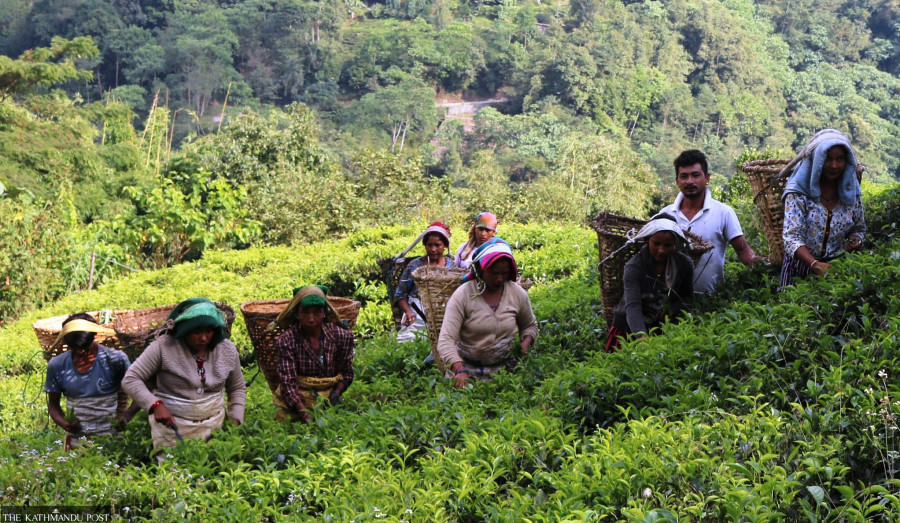Money
Organic push threatens tea growers in eastern hills
Many growers have stopped applying chemical fertiliser as part of the organic push but they are not getting the organic manure on time, which has been threatening their farm productivity.
Biplav Bhattarai
Nepal's orthodox tea received its own trademark last September, 157 years after the country started growing it, and many growers were hopeful that the move would carve its niche in the international market. But the organic push has threatened growers.
Aditya Parajuli, vice president of Nepal Tea Producers Association, said organic tea growers' plan comes with huge risks. “They are not getting organic fertiliser on time. That’s largely impacting the production.”
For tea growers, their plants can't make it without the nutrients from fertilisers. Many growers have stopped applying chemical fertiliser as part of the organic push but they are not getting the organic manure, which has been threatening their farm productivity.
The lack of fertiliser is just one of the myriad of problems that tea growers in eastern Nepal have been facing. The availability of finance is another.
To get the organic certification for their produce, tea growers and entrepreneurs have to spend more than Rs500,000 annually which is too much for most.
The eastern hill district in Ilam is aspiring to become a completely organic tea zone.
The trademark is granted for producing organic tea. The National Tea and Coffee Development Board has so far granted trademarks to 24 tea producers.
Nepali orthodox tea has been gaining popularity in the international market because of its quality, aroma, taste and aftertaste. But other popular tea brands, such as Darjeeling tea, overshadow the Nepali product abroad due to lack of branding, according to Nepali traders.
Along with Ilam, tea producers from Panchthar, Tehrathum and Sankhuwasabha districts have received a trademark or logo named 'Nepal Tea Quality from the Himalayas'.
The effective implementation of the logo does not seem to be as easy as promoted due to the provision to acquire the trademark which is costly and full of hassles, entrepreneurs said.
In order to obtain a trademark, tea must be certified organic in full compliance with the code of conduct.
However, farmers lack organic manure for organic tea production.
Uday Chapagain, a tea entrepreneur who is also a member of the board, said that for organic production, there is no sufficient availability of organic manure.
"Tea growers and producers have invested heavily to get the trademark but it’s challenging to comply with the process," said Rabin Rai, secretary of the Central Tea Cooperative Association.
“Even some tea growers who have obtained the trademark have not understood its importance. It is also difficult for tea producers who buy green tea leaves from farmers to fulfil all standards.”
A decade and a half ago, Nepali tea exports to the European market were halted due to the presence of pesticide residue in the product. Later, some tea gardens and factories, however, succeeded in convincing international buyers by making tea completely organic.
The government policy needs to be clear in the tea sector, said Parajuli.
The government had allocated a budget of Rs40 million for the promotion of the tea sector last year but it was not utilised due to the pandemic.
Parajuli said that the budget is expected to be implemented this year as the process has already started.
Tea growers are not getting the value for green tea leaf and workers are not getting fair wages. “There are problems everywhere,” said Parajuli.
Suryodaya Municipality, for instance, has fixed the minimum price of tea leaves and even helped farmers to produce quality tea. But despite that, tea growers complain that they are still not getting the proper value of their produce.
The minimum support price of green tea leaf in Suryodaya has been fixed at Rs40 per kg which is set by the municipality. "There are problems galore. But we are ready to move forward by collaborating with the board to resolve the overall problem in the tea sector," said Rana Bahadur Rai, mayor of the municipality.
With several problems in the tea sector, the National Tea and Coffee Development Board has been accused of not playing its expected role in the improvement of the tea sector.
But the board said they have started controlling pesticides used in tea gardens, preventing green tea leaves from crossing the border into India and have started reaching out to farmers with plans for trade promotion, quality improvement and market expansion.
"We are trying to resolve problems," said Bishnu Kumar Bhattarai, executive director of the board. “As Nepali tea has its own logo, it has made its own identity in the international market,” he said. This has helped in improving tea quality.”
Many tea growers are exploring green tea leaves in India and the local factories have been facing a shortage. “The ward has also started a campaign to stop the export of green tea leaves to India,” said Bhattarai.
Stakeholders suggest that trademark implementation should be accorded a high priority to increase the export of orthodox tea, which is highly demanded in the global market.
Out of the 6,000 tonnes of orthodox tea produced in the hilly areas including Ilam, only 10 percent is exported in the overseas market.
Nearly 80 percent of orthodox tea is exported to India. Nepal earns Rs5 billion annually from tea exports.
Orthodox teas are high-quality teas that are brisk and more nuanced than ordinary CTC tea, which leaves a bitter aftertaste.
There are two dozen big tea factories along with numerous small and medium-sized ones in Ilam alone. All of them produce orthodox tea. Since large factories buy and process green tea leaves from smallholders, there is a problem making them all organic at once.
Experts say that the lack of control over the use of banned pesticides, lack of organic manure and lack of adequate technical knowledge have been hindering the organic tea campaign.




 22.12°C Kathmandu
22.12°C Kathmandu













